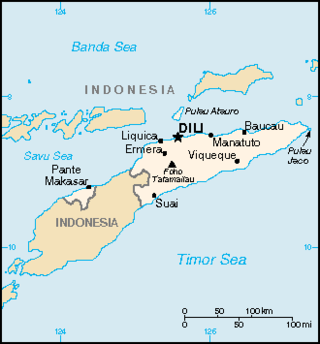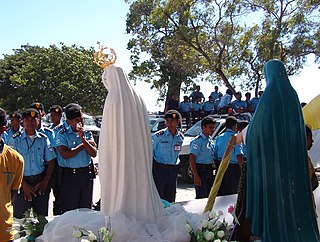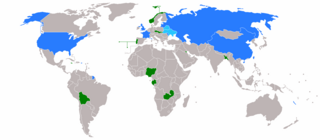
United Nations Security Council Resolution 156, adopted on September 9, 1960, after receiving a report from the Secretary-General of the Organization of American States (OAS) the Council noted its approval regarding the first resolution of the Meeting of Consultations of Ministers of Foreign Affairs of the American Republics whereby an agreement was reached on the application of measures regarding the Dominican Republic.
United Nations Security Council Resolution 180, adopted on July 31, 1963, affirmed that Portugal claiming its overseas territories as part of metropolitan Portugal was contrary to the principles of the Charter. The Council deemed Portugal's actions and attitude as seriously disturbing to peace and security in Africa.
United Nations Security Council Resolution 204, adopted unanimously on May 19, 1965, after a complaint by Senegal against Portugal, the Council deplored incursions by the Portuguese Armed Forces into Senegalese territory and requested that they take whatever measures necessary to assure Senegal's territorial integrity.
United Nations Security Council Resolution 218, adopted on November 23, 1965, after recalling previous resolutions on the topic, and Portugal's failure to implement them, the Council again demanded that Portugal withdrawal its military presence from her colonies and enter negotiations with political parties there regarding independence.
United Nations Security Council Resolution 275, adopted on December 22, 1969, after a letter from the representative of Guinea and observing that these incidents by Portugal jeopardize international peace and security, the Council called upon Portugal to desist from violating the sovereignty and territorial integrity of Guinea. The Council deeply deplored the loss of life and heavy damage to several Guinean villages inflicted by the action from Guinea-Bissau, a territory under Portuguese administration, solemnly warning Portugal that if such acts were to be repeated in the future the Council would consider further steps to give effect to the resolution. It also called upon Portugal to release a motor barge by the name of Patrice Lumumba and all of its passengers.
United Nations Security Council Resolution 290, adopted on December 8, 1970, after more invasions of the territory of the Republic of Guinea by naval and military units of Portugal on November 22/23 and 27/28, the Council reaffirmed its numerous previous resolutions on the topic, including the right of the peoples of Angola, Mozambique and Portuguese Guinea to be freed from the Portuguese Empire ruled by the Estado Novo regime. The Council endorsed the conclusions of the report by the Special Mission to the Republic of Guinea, strongly condemned the Portuguese Government, demanded that full compensation be paid to the Republic and declared that Portuguese colonialism was a serious threat to the peace and security of Africa.
United Nations Security Council Resolution 312, adopted on February 4, 1972, after reaffirming previous resolutions on the topic and deploring those who failed to conform to them the Council called upon Portugal to immediately recognize the right of the peoples of her colonies to self-determination, to cease all acts of repression against the peoples of Angola, Mozambique and Guinea (Bissau), to withdraw its armed forces from those areas, to promulgate an unconditional political amnesty and to transfer power to freely elected native representative institutions.
United Nations Security Council Resolution 321, adopted on October 23, 1972, after reaffirming previous resolutions, the Council expressed its concern that Portugal persistently refused to comply with them. The Council attacked the latest cross-border action by the Portuguese army against Senegalese territory and demanded that the Portuguese cease any further acts of violence. The Council went on to reaffirm their position that Portugal's continued holding of colonies in Africa was unjust and that the native peoples of those colonies should be allowed self-determination.

United Nations Security Council Resolution 322, adopted unanimously on November 22, 1972, after reaffirming previous resolutions and considering the Organisation of African Unity's recognition of the revolutionary movements of Angola, Guinea-Bissau, Cape Verde and Mozambique, the Council called on the government of Portugal to cease its military operations and all acts of repression against the people of those territories. The Resolution called on Portugal to enter negotiations with the parties concerned with a view to achieving a solution to the armed confrontations and permitting the peoples of those territories to exercise their right to self-determination and requested the Secretary-General to follow developments and report periodically to the Council.

United Nations Security Council Resolution 384, adopted on December 22, 1975, noted statements from the representatives of Portugal, Indonesia and East Timor and recognized the right of the people of East Timor to self-determination and independence in accordance with the Charter. The Council expressed its grave concern with the deterioration of the situation in East Timor, deplored the intervention of the armed forces of Indonesia in that nation and expressed its regret that Portugal did not discharge fully its responsibilities as administering Power.

United Nations Security Council resolution 817, adopted unanimously on 7 April 1993, after examining the application of the Republic of Macedonia for membership in the United Nations, the council recommended to the General Assembly that Macedonia be admitted to membership in the United Nations, this State being provisionally referred to for all purposes within the United Nations as "the former Yugoslav Republic of Macedonia" pending settlement of the difference that has arisen over the name of the State.

United Nations Security Council resolution 900, adopted on 4 March 1994, after reaffirming all resolutions on the situation in Bosnia and Herzegovina, the Council discussed the restoration of essential public services and normal life in and around the capital Sarajevo.

United Nations Security Council resolution 1236, adopted unanimously on 7 May 1999, after recalling previous resolutions on East Timor including 384 (1975) and 389 (1976), the Council welcomed an agreement between Indonesia and Portugal on the future of East Timor and a proposed United Nations presence to assist with the East Timor Special Autonomy Referendum scheduled for August 1999.
United Nations Security Council resolution 1246, adopted unanimously on 11 June 1999, after recalling previous resolutions on East Timor, particularly Resolution 1236 (1999), the council established the United Nations Mission in East Timor (UNAMET) to organise and conduct the East Timor Special Autonomy Referendum on the future status of East Timor, scheduled for August 1999.

United Nations Security Council resolution 1262, adopted unanimously on 27 August 1999, after recalling previous resolutions on East Timor, particularly resolutions 1246 (1999) and 1257 (1999), the Council extended the mandate of the United Nations Mission in East Timor (UNAMET) until 30 November 1999.

Resolution 1973 was adopted by the United Nations Security Council on 17 March 2011 in response to the First Libyan Civil War. The resolution formed the legal basis for military intervention in the Libyan Civil War, demanding "an immediate ceasefire" and authorizing the international community to establish a no-fly zone and to use all means necessary short of foreign occupation to protect civilians.

United Nations Security Council Resolution 1690, adopted unanimously on June 20, 2006, after reaffirming previous resolutions on East Timor (Timor-Leste), particularly resolutions 1599 (2005) and 1677 (2006), the Council renewed the mandate of the United Nations Office in Timor-Leste (UNOTIL) for two months until August 20, 2006.

United Nations Security Council Resolution 1814 was unanimously adopted on 15 May 2008. The resolution called for the United Nations to provide economic, political and technical support to Somalia, with a possible UN peacekeeping force.

The 1982 United Nations Security Council election was held on 19 October 1982 during the Thirty-seventh session of the United Nations General Assembly, held at United Nations Headquarters in New York City. The General Assembly elected Malta, the Netherlands, Nicaragua, Pakistan, and Zimbabwe, as the five new non-permanent members of the UN Security Council for two-year mandates commencing on 1 January 1983. Both Malta and Zimbabwe were elected members of the Council for the first time.

The 1978 United Nations Security Council election was held on 10 November 1978 during the Thirty-third session of the United Nations General Assembly, held at United Nations Headquarters in New York City. The General Assembly elected Bangladesh, Jamaica, Norway, Portugal, and Zambia, as the five new non-permanent members of the UN Security Council for two-year mandates commencing on 1 January 1979. Notably, Bangladesh, Jamaica and Portugal were elected members of the council for the first time.











